Iran calls for regional unity among Muslims against Israel
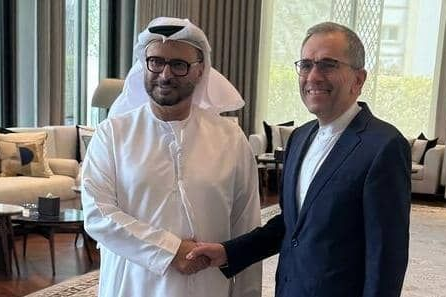
Iran's deputy foreign minister called for unity among Muslim nations in response to what he called Israeli destabilizing actions and provocations in the region, Iranian state media reported.

Iran's deputy foreign minister called for unity among Muslim nations in response to what he called Israeli destabilizing actions and provocations in the region, Iranian state media reported.
Majid Takht-Ravanchi made the remarks in a Saturday meeting in Abu Dhabi with the UAE president's diplomatic advisor Anwar Gargash.
The two sides also discussed bilateral relations as well as pressing regional and international issues, according to Iran's official news agency IRNA.
Takht-Ravanchi underlined Iran’s commitment to forging closer ties with neighboring countries, expressing Tehran's preparedness to enhance relations with the UAE based on mutual interests.
The UAE and Iran repaired their diplomatic ties in 2022, about six years after Abu Dhabi cut diplomatic relations in allegiance with Saudi Arabia after the 2016 looting of the Saudi embassy in Tehran.
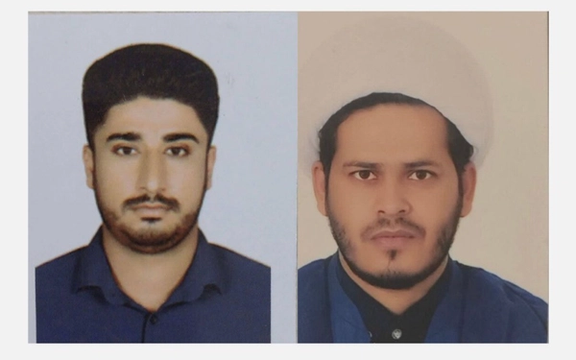
Two members of the IRGC's Basij paramilitary forces were assassinated on Saturday in Iran's restive Sistan-Baluchestan province, the Quds Base of the IRGC Ground Forces announced.
According to the statement, "Hojatoleslam Sadegh Mahmoudi and Milad Damankesh were targeted by terrorists while traveling home from work in a private vehicle and were martyred in the attack." The two were part of the Shahid Sajjad Security Plan.
Sunni militant group Jaish al-Adl in a statement on Saturday claimed responsibility for the attack.
Iran's Sistan-Baluchestan province has long been a flashpoint for violence, frequently targeted by Jaish al-Adl, which is known for ambushes, bombings, and armed attacks that have claimed the lives of both civilians and security forces.
The incident follows a surge in violence in the province. In February, the group took responsibility for a bombing in Chabahar that destroyed a government coordination office, as well as an armed assault on a Housing Foundation building.
Jaish al-Adl said those attacks were in retaliation for policies displacing local Baluch communities. The Baluch are one of the poorest ethnic groups in Iran, suffering from lack of decent public services and infrastructure.
Both Iran and the United States have designated Jaish al-Adl as a terrorist organization. The group has carried out multiple attacks on Iranian military and IRGC positions in recent years.
In November, four members of the Islamic Revolutionary Guard Corps were killed in clashes during a military drill in Rask County. In October, Jaish al-Adl claimed responsibility for an attack that killed ten Iranian military personnel.
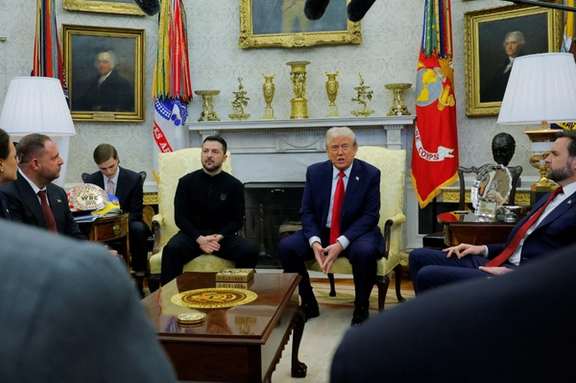
Shortly after the Oval Office blowout between the presidents of Ukraine and the United States, the office of Iran's Supreme Leader reposted his 2022 criticism of Ukrainians' reliance on Washington.
"The first lesson from the situation in Ukraine is that Western support for countries and governments that are their puppets is a mirage," the post on Ali Khamenei's X account quotes him as saying in Ukrainian.
"All governments must understand this. Those governments relying on the US and Europe should look at the current situation in Ukraine," the post reads, citing his remarks from March 1, 2022.
Khamenei's office reposted his old comments in reaction to Friday’s controversial meeting between US President Donald Trump and his Ukrainian counterpart Volodymyr Zelensky, in an apparent effort to vindicate his longtime opposition to the West, and the US in particular.
Over the past few hours, many Iranian hardliners have claimed that the Trump-Zelensky blowout validates Khamenei’s opposition to negotiations with the United States.
Citing Khamenei’s early February speech, in which he declared negotiations with the Trump administration would not be “wise, expedient, or dignified,” they argue that Trump's confrontational exchange with Ukrainian President Volodymyr Zelensky in the Oval Office should serve as a warning to those who question Khamenei’s stance.
On social media, hardliners have also extensively highlighted Khamenei’s warnings in the past about direct talks with the United States and his criticism of Trump for not abiding by the commitments the US had made in the 2015 JCPOA nuclear deal and re-imposition of sanctions on Iran in 2018.
Following the Oval Office incident, some reformist politicians and commentators—who have generally supported direct talks with the United States—also voiced skepticism about the viability of negotiations with the Trump administration.
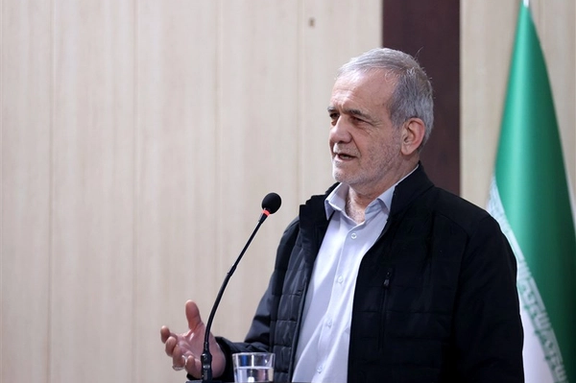
A Tehran-based pro-reform newspaper called on president to take concrete steps toward negotiations with the United States, arguing that rhetoric alone will not resolve Iran’s economic crisis.
Responding to Masoud Pezeshkian’s remarks on Thursday saing,"We will not bow to bullies. We should not fear what they plan to do with sanctions. Some say we have no choice but to negotiate"—the reformist daily Ham Mihan questioned his approach.
"You say you don't shy away from dialogue—so why not put the ball in the opponent’s court?" the editorial argued. It urged the president to work toward halting the Trump administration's escalating sanctions, establish a negotiation agenda, and set a clear timeframe for talks.
The newspaper dismissed the notion that negotiating with the US equates to surrender, writing, "If they [the US] act like bullies and demand more than they offer, then inform the people and reject their terms. Otherwise, negotiations will yield results. Those who argue that we have no choice but to negotiate are not advocating surrender—because surrender requires no negotiation."
The debate over talks with the United States comes as Iran faces increasing economic pressure. In February, US President Donald Trump reinstated sanctions under his “maximum pressure” policy, calling for a deal that would permanently prevent Iran from acquiring nuclear weapons.
More recently, Trump signed a directive aiming to reduce Iran’s oil exports to zero, arguing that Tehran cannot be allowed to have a nuclear weapon and must make a deal.
"I would prefer a deal with Tehran to an Israeli attack on their nuclear sites," he said after signing the memorandum that reinstated the sanctions.
Iran’s Supreme Leader Ali Khamenei has dismissed engagement with Trump, calling negotiations "not wise, expedient, or dignified."
Beyond foreign policy, Ham Mihan also examined Pezeshkian’s economic promises, particularly his statement that "If shares are to be allocated, they should go to those truly in need, not to the wealthy."
These are good words, wrote Ham-Mihan. “So why hasn’t it been implemented? You have repeated it several times already. Moreover, your proposed national budget contradicts this notion of justice. You have increased salaries at half the rate of inflation.”
On Pezeshkian’s comments that "we are not afraid; we will stay and build the country with strength," Ham Mihan argued that fear is sometimes necessary.
"People are afraid. Officials should also be afraid. We should fear the people becoming angry. We should fear that some are unable to secure a dignified life... We should fear being unable to provide water and electricity for the people, leading to factory closures and even government shutdowns."
Iran continues to struggle with mounting economic and social crises, exacerbated by years of sanctions, government mismanagement, and public unrest. The 2022 protests, sparked by the death of Mahsa Amini in police custody, evolved into broader demonstrations against political repression and economic hardship. The government’s crackdown further eroded trust in state institutions.
The national currency has suffered a dramatic collapse, with the rial recently surpassing 940,000 per US dollar. Inflation remains persistently high, driving up the cost of food, housing, and healthcare. Energy shortages have worsened the crisis, with rolling blackouts disrupting industries and daily life.
The editorial concluded by warning Pezeshkian that rhetoric alone will not satisfy public expectations: " Let us fear that people pin their hopes on us, only for us to disappoint them and make them turn away. In fact, more than anything, we are in need of fear."
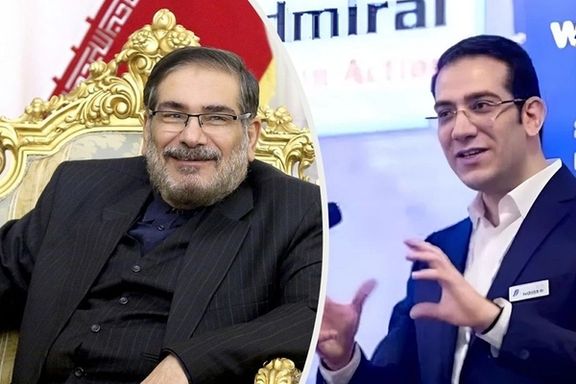
The lawyer for the son of a key figure in Iran’s ruling elite says they have filed a lawsuit against Bloomberg over a report alleging his involvement in Iranian oil trade linked to Russia and global energy markets.
However, the lawyer, as quoted by Iranian media, did not specify where or when the lawsuit was filed. Iran International has not independently verified whether the lawsuit has actually been filed.
Hossein Shamkhani, the son of former security chief Ali Shamkhani, is at the center of the controversy. In December 2024, Ali Shamkhani, who served as secretary of the Supreme National Security Council (SNSC) from 2013 to 2023, declared himself a key decision-maker on Iran's global strategy and nuclear diplomacy.
ILNA published the interview on Saturday, in which the lawyer rejected Bloomberg’s reporting on Milavous Group Ltd., a company that Bloomberg reported had a financial turnover of $15 billion in 2022 and was part of Shamkhani’s business network.
The lawyer, who was not named, dismissed Bloomberg’s reporting as "completely fabricated", saying: "Mr. Shamkhani is neither the owner nor a shareholder of Milavous Group, and the numbers Bloomberg published are pure fiction. If they had any proof, they would have published it by now."
"We have taken legal action against Bloomberg for publishing false and baseless accusations against Mr. Shamkhani. They have provided no evidence to support their reporting, despite repeated requests," the lawyer told ILNA.
Bloomberg’s investigation described Milavous Group as a major player in the global oil market, allegedly engaged in blending and rebranding crude oil from Iran and Russia to obscure its origins. According to the report, sources familiar with the matter said that Shamkhani oversaw a sprawling web of interconnected businesses facilitating illicit Iranian oil sales. The report also noted that Milavous and other companies in Shamkhani’s network supply oil to major buyers, including China’s Sinopec, Chevron in the US, and BP in the UK.
However, Shamkhani’s unnamed lawyer said the financial claims about Milavous were inaccurate.
"We obtained financial records for Milavous Group, audited by an American firm, and they show that the company's turnover was just $9.2 million in 2022 and around $9.9 million in 2023. These figures are nowhere near what Bloomberg published," the lawyer said.
The Bloomberg report also noted that while Hossein Shamkhani has not been sanctioned, some of the vessels believed to be under his control had been blacklisted by the US Treasury. The investigation cited multiple unnamed sources alleging that Shamkhani’s network had deep ties to both Iranian and Russian oil markets, benefiting from the lack of direct sanctions against him.
Additionally, in December, Bloomberg reported that Hossein Shamkhani plays a key role in the supply of Iranian arms to Russia, citing more than a dozen unnamed US, UK, and European officials, as well as individuals with direct knowledge of his activities.
Despite these allegations, both Shamkhani and Milavous have denied any wrongdoing. A separate lawyer representing Shamkhani previously told Bloomberg that the allegations were "baseless and lacking supporting evidence." Similarly, Milavous Group's managing director, Mohamed Al Hashmi, dismissed any connection to Shamkhani or involvement in Iranian or Russian oil trading.
Shamkhani’s legal team now insists that the lawsuit will hold Bloomberg accountable for what they describe as "irresponsible and false reporting."
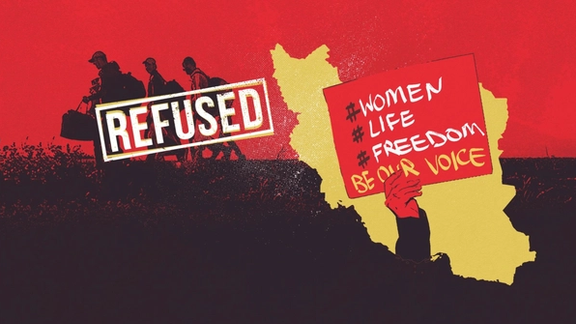
Two years after Iran's 2022 protests, escaped dissidents tell Iran International about bureaucratic hurdles and asylum denials.